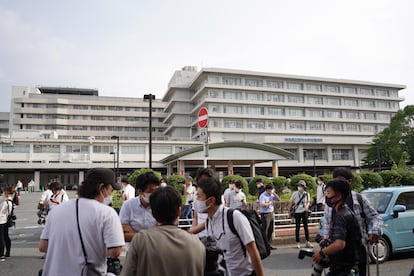Japan is on high alert as record numbers of streptococcus infections are reported
Health authorities believe that the rise in respiratory illness is probably related to the easing of pandemic restrictions


A rise in cases of streptococcal toxic shock syndrome, a severe bacterial infection known for its rapid progression and high mortality rate, has prompted health authorities in Japan to be on high alert. The recorded cases of this rare but serious infection hit a peak of 941 in Japan in 2023, as reported by the National Institute of Infectious Diseases (NIID) and Japanese media. The numbers have been steadily increasing, with 378 new cases reported as of February 25, representing 40% of all the 2023 cases in less than two months.
Streptococcal toxic shock syndrome (STSS) is mostly caused by group A streptococcus bacteria. It was first detected in Japan over three decades ago, with an average of 100 to 200 cases reported annually in a population of around 125 million. Prevalence was rising before the pandemic, hitting a peak of 894 cases in 2019, according to The Asahi Shimbun newspaper. The infection resurfaced after the easing of pandemic restrictions.
STSS, also known as “flesh-eating disease,” can lead to tissue necrosis of the muscles in severe cases. While people of all ages can get infected, it’s more prevalent in those over 30 years old. Japanese media reports citing NIID indicate a 30% mortality rate for those affected.
Most people with strep show no symptoms or just have a sore throat and skin issues. Japanese authorities cited by The Japan Times warn that if the bacteria spreads to the blood, muscles or lungs, symptoms can quickly worsen, leading to high blood pressure, organ failure, and in extreme cases, death. To date, cases have been detected in 45 of Japan’s 47 prefectures. In January, the Health Ministry asked local governments to take samples from patients diagnosed with this infection to identify the various strains.
The Centers for Disease Control and Prevention (CDC) says that any group A streptococcal infection can lead to toxic shock syndrome. The infection begins when bacteria enter the body through a compromised barrier, like a skin lesion or mucous membranes. These bacteria then spread to deeper tissues and eventually enter the bloodstream. The main sites of entry for streptococci leading to toxic shock syndrome are the pharynx, vagina, mucosa, and skin/soft tissue. Any skin injury or breach, including surgical incisions, can also be an entry point for the bacteria. “Unfortunately, route of entry remains unknown for up to 50% of cases,” stated the CDC. Treatment requires hospitalization, antibiotic therapy and removal of the source of infection, through surgery if necessary. The CDC estimates the STSS mortality ranges from 30% to 70%.
Preventive measures
Japan’s Health Minister Keizo Takemi stated in January that while the exact cause of the rise is unclear, it’s likely linked to the resurgence of respiratory illnesses in the post-pandemic period, now that Covid-19 is more like a seasonal flu. With the easing of preventive measures by the Japanese government, the health minister stressing the importance of good hygiene practices as group A streptococcus spreads through respiratory droplets and surface contact. “We encourage preventive measures like keeping hands clean and following proper coughing etiquette,” Takemi told The Japan Times.
According to The Asahi Shimbum, Takashi Nakano, a professor of infectious diseases at Kawasaki Medical School, said, “There are many things we don’t know, such as why the bacteria becomes so acute. To prevent infectious diseases, take simple steps like washing hands and keeping wounds clean.” Nakano also suggested getting medical help right away if symptoms seem unusually severe.
Sign up for our weekly newsletter to get more English-language news coverage from EL PAÍS USA Edition
Tu suscripción se está usando en otro dispositivo
¿Quieres añadir otro usuario a tu suscripción?
Si continúas leyendo en este dispositivo, no se podrá leer en el otro.
FlechaTu suscripción se está usando en otro dispositivo y solo puedes acceder a EL PAÍS desde un dispositivo a la vez.
Si quieres compartir tu cuenta, cambia tu suscripción a la modalidad Premium, así podrás añadir otro usuario. Cada uno accederá con su propia cuenta de email, lo que os permitirá personalizar vuestra experiencia en EL PAÍS.
¿Tienes una suscripción de empresa? Accede aquí para contratar más cuentas.
En el caso de no saber quién está usando tu cuenta, te recomendamos cambiar tu contraseña aquí.
Si decides continuar compartiendo tu cuenta, este mensaje se mostrará en tu dispositivo y en el de la otra persona que está usando tu cuenta de forma indefinida, afectando a tu experiencia de lectura. Puedes consultar aquí los términos y condiciones de la suscripción digital.








































